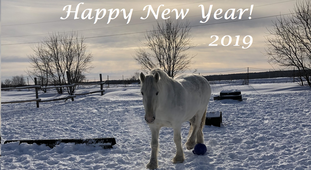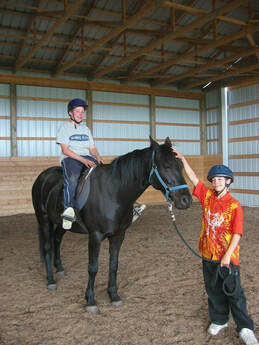
Our EFW-Canada team send you loving and kind New Year wishes. We want to thank you for giving us the opportunity to inspire and inform your Equine Facilitated Wellness practice and your relationship with your equines.
We are pleased to start off the new year with the second of ten articles in Sue McIntosh's "Frequently Asked Questions" Series. Sue McIntosh is the founder of Healing Hooves in Cremona, Alberta. She offers services in Equine and Animal Assisted Therapy, counselling, parent support, professional training and resources in Equine Facilitated Wellness (EFW), child development and attachment, to adults, children families and professionals since 1999. We are proud to have her as a tri-certified EFW-Can trainer, mentor and practitioner. Please enjoy the article she graciously offers to help us navigate how to get started in equine therapy.
We are pleased to start off the new year with the second of ten articles in Sue McIntosh's "Frequently Asked Questions" Series. Sue McIntosh is the founder of Healing Hooves in Cremona, Alberta. She offers services in Equine and Animal Assisted Therapy, counselling, parent support, professional training and resources in Equine Facilitated Wellness (EFW), child development and attachment, to adults, children families and professionals since 1999. We are proud to have her as a tri-certified EFW-Can trainer, mentor and practitioner. Please enjoy the article she graciously offers to help us navigate how to get started in equine therapy.
Q2: Do I Need to be a Counsellor to work in Equine Therapy?
By Sue McIntosh
The Quick Answer
Only if you plan to offer counselling services! If you plan to work in Equine Facilitated Learning (EFL), or as an Equine Professional (EP) who partners with a Mental Health Professional (MHP), there is no requirement to be a counsellor or MHP. If you plan to deliver mental health services or to work with people with mental health diagnoses or needs then yes, you need to be a certified mental health professional such as a counsellor, psychologist or social worker.
The Longer Answer
Note: If you are unsure of any of the terminology or acronyms we are using please refer to our last blog post where we defined and reviewed these terms for you.
If you plan to work with clients with mental health diagnoses or needs and/ or to work on mental health related goals (such as recovery from trauma or addictions) in the EFW field, then this work is defined as Equine Facilitated Mental Health (EFMH). To deliver mental health services you need to either be a certified mental health professional (MHP), or partner with a certified MHP, regardless of whether you are incorporating animals into your work or not. This helps keep everyone safe, physically and emotionally, including your clients, your equine partners and yourself.
The terms “counsellor’ and ‘therapist’ are currently unregulated in Alberta but this is facing imminent change as the government considers legislation requiring anyone using these terms to meet certain minimum education, training and regulatory requirements. In other provinces these terms are already regulated, as the terms psychologist and social work are in Alberta. If you are interested you can find more information on this situation here.
If you plan to work with clients with mental health diagnoses or needs and/ or to work on mental health related goals (such as recovery from trauma or addictions) in the EFW field, then this work is defined as Equine Facilitated Mental Health (EFMH). To deliver mental health services you need to either be a certified mental health professional (MHP), or partner with a certified MHP, regardless of whether you are incorporating animals into your work or not. This helps keep everyone safe, physically and emotionally, including your clients, your equine partners and yourself.
The terms “counsellor’ and ‘therapist’ are currently unregulated in Alberta but this is facing imminent change as the government considers legislation requiring anyone using these terms to meet certain minimum education, training and regulatory requirements. In other provinces these terms are already regulated, as the terms psychologist and social work are in Alberta. If you are interested you can find more information on this situation here.
But the Equine Facilitated Wellness field is broad, flexible and varied!
 School groups may be EFMH or EFL depending upon the participants' needs and the group's focus
School groups may be EFMH or EFL depending upon the participants' needs and the group's focus EFW includes the highly valuable and varied area of Equine Facilitated Learning (EFL) which does NOT require you to be a counsellor or MHP. This includes EFW work in the areas of coaching, team building, personal growth, skills building, literacy and more. You can also work as an Equine Professional (EP), either focusing on therapeutic horsemanship, or partnering with a MHP or EFL Professional to offer services in the areas of EFL and/ or EFMH.
There are lots of options and ways to do this work.
Whether the approach being followed in any particular case is EFMH or EFL depends on a number of factor including the needs of the population being worked with and the focus of the work. A key aspect of the Equine Facilitated Wellness-Canada approved training process is to help each participant define and communicate their own unique Scope of Practice which defines the parameters for their EFW work and determines the nature of their certification with EFW Canada.
There are lots of options and ways to do this work.
Whether the approach being followed in any particular case is EFMH or EFL depends on a number of factor including the needs of the population being worked with and the focus of the work. A key aspect of the Equine Facilitated Wellness-Canada approved training process is to help each participant define and communicate their own unique Scope of Practice which defines the parameters for their EFW work and determines the nature of their certification with EFW Canada.
Your Scope of Practice is unique to you and will reflect and be built upon your life and work experience, your education, and your credentials – with both people and with horses. It will also reflect both the population/s you plan to work with, and the approach/es you plan to follow. We help you develop and fine tune this scope of practice throughout your training journey.
In our experience most people underestimate the wealth of experience and skills they already possess - with both people and horses - which are relevant to what they plan to develop within the EFW field.
We all, regardless of the extent and nature of our training and credentials, need to define and communicate what is we can, should and want to do, with both people and horses; as well as what is outside of our scope of practice. If we don’t do this, we risk doing harm to our clients, our horses and ourselves. This includes situations where we define our scope in one area but in reality are stepping into work which is actually outside of that scope. This can apply to both our scope of practice with people and our scope of practice with horses.
Rather than limiting us, Scope of Practice empowers us to focus on the areas where we are competent and confident, and to communicate this clearly to our clients. I found defining my own scope of practice to be both reassuring and liberating. It helped me better define to myself, the agencies I work with, and prospective clients what it is I am qualified and able to do, and what I am not. It also allows me, when presented with a request to do work with a population or in an area (of either human services or horsemanship) where I do not have enough experience or expertise to say, “I’m sorry, but that falls outside of my scope of practice, let me refer you to someone who has the training in that area.”
And I do.
In our experience most people underestimate the wealth of experience and skills they already possess - with both people and horses - which are relevant to what they plan to develop within the EFW field.
We all, regardless of the extent and nature of our training and credentials, need to define and communicate what is we can, should and want to do, with both people and horses; as well as what is outside of our scope of practice. If we don’t do this, we risk doing harm to our clients, our horses and ourselves. This includes situations where we define our scope in one area but in reality are stepping into work which is actually outside of that scope. This can apply to both our scope of practice with people and our scope of practice with horses.
Rather than limiting us, Scope of Practice empowers us to focus on the areas where we are competent and confident, and to communicate this clearly to our clients. I found defining my own scope of practice to be both reassuring and liberating. It helped me better define to myself, the agencies I work with, and prospective clients what it is I am qualified and able to do, and what I am not. It also allows me, when presented with a request to do work with a population or in an area (of either human services or horsemanship) where I do not have enough experience or expertise to say, “I’m sorry, but that falls outside of my scope of practice, let me refer you to someone who has the training in that area.”
And I do.

